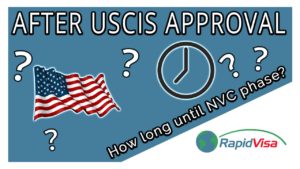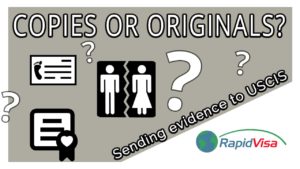Page 2 of the ‘CR1 Spousal Visa’ Category
Here you will find frequently updated information about getting your CR-1 Visa, and immigrating to the United States to join your husband or wife. Don’t forget to visit our Spousal Visa Overview page if you haven’t already.
12Apr2019
For a family-based immigrant visa, you cannot sponsor yourself. The petitioner must file Form I-864, Affidavit of Support, on your behalf. In certain situations you may be able to include your income and/or assets with the petitioner's household income/assets. The income must continue from the same source after obtaining lawful permanent resident status in the […]
Read More »
15Mar2019
Yes, you can get married in the US while on a tourist visa. It happens all the time, and doesn’t always have anything to do with immigration. For example, two Japanese tourists getting married in Hawaii.
Read More »
08Mar2019
Can I sponsor my husband if my housemate gets social security benefits at my address? Yes, certainly, if your housemate is not a dependent. It's not uncommon to have multiple households living in one house. The "household" refers to all people depending on the same financial means, usually indicated by if you file taxes together. […]
Read More »
12Feb2019
No. A joint sponsor can be any US citizen or legal permanent resident who is at least 18 years old and meets the income requirements.
Please be advised that some embassies don’t allow the use of joint sponsors for fiance visas. Among these is the Philippines and Vietnam, among others.
Read More »
07Jan2019
You will have to file another petition for the child. You will need to file a new I-130 and all the same documents that you filed for your husband, but you can petition for the child. Be forewarned that when a green card holder petitions for a spouse or a step-child, the spousal visa processing time takes substantially longer than if you were a US citizen petitioning for a spouse or step-child.
Read More »
04Jan2019
All applicants preparing to enter the US on a CR1 spousal visa are required to complete a medical exam before the consular officer will approve it. This medical exam is at the end of the process. We recommend completing the medical exam at least five to ten business days prior to the interview to ensure that the medical exam results are going to get over to the U.S.
Read More »
07Dec2018
The number one reason we’re seeing right now is for finances. That’s the affidavit of support. We used to see quite a few RFEs, but now we’re actually seeing denials come in, because they do not meet the income requirements. For a fiance visa, you have to meet 100% of the HHS Poverty Guideline, and for a spousal visa or adjustment of status, it’s 125%, and you can check Form I-684p here.
Read More »
29Nov2018
I'm curious about being a sponsor. How long do I need to be at my job for proof of income, and how do I use my home to sponsor my spouse? If I want to bring a foreign individual to the USA, be that a spouse or a child or a parent, or a brother, […]
Read More »
21Nov2018
Prior to 2018, it used to take about four to six weeks to get the invoice from the NVC. The invoice is going to be a request for payment for your affidavit support and for your DS-260 visa application. When you receive that invoice, you’ll pay those fees online, and then along with that letter, you’ll also receive what’s called the NVC Checklist.
Read More »
08Nov2018
You should never send original supporting evidence to the USCIS, unless they specifically ask for it. Always send a photocopy. The USCIS won’t return you your original supporting documents back either, so be prepared to never see them again if you send those in.
Read More »









